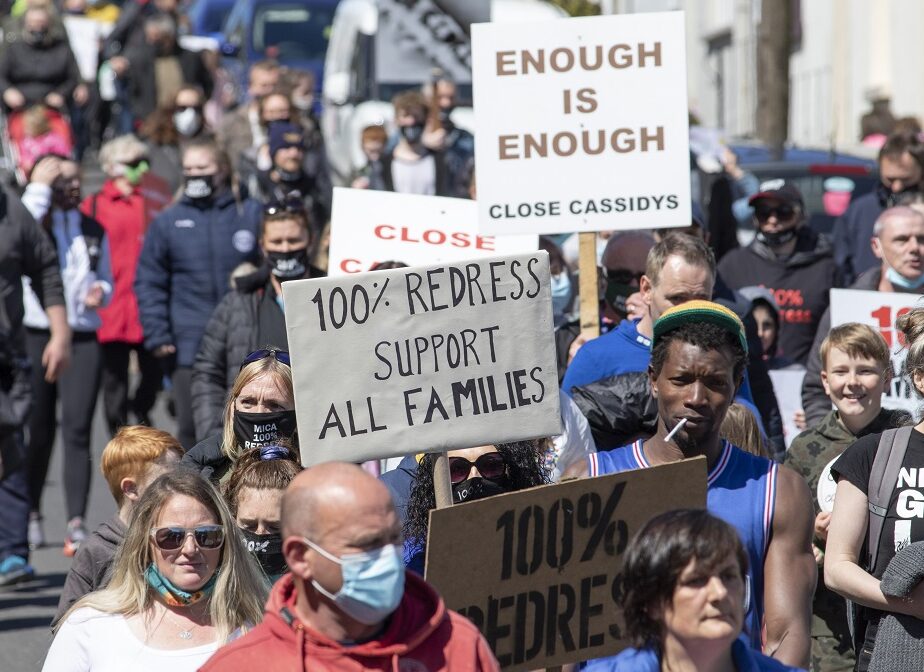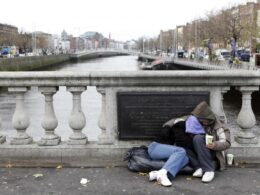By Jonathan Diebold
It has been several years now since the Mica scandal first broke, and while there seems to finally be a glimmer of progress, campaigners suspect this may be a false hope. It is important that pressure is kept up on the government to ensure that the latest measures being debated this week – the “Remediation of Dwellings Damaged by Defective Concrete Blocks Bill 2022” – do not fall short of the needs of the victims of the scandal, as previous measures did. Right now, activists on this issue are extremely worried.
Light-touch regulation
Seven thousand homes are now affected by mica and pyrite, primarily in Donegal, Mayo, Sligo, and Limerick. The presence of these naturally occurring substances causes concrete blocks to crumble over time when exposed to water. Thousands of families have had to wake up every day in homes that could crumble around them at any moment if they haven’t been forced to leave already – no easy thing in a country already gripped by a housing crisis and a cost-of-living crisis. This is a direct result of light-touch regulation on big business by right-wing governments over the course of decades, as well as the commodification of people’s housing and people’s lives.
100% redress
The houses of the Oireachtas first saw legislation proposed for redress for victims of this issue all the way back in 2018. Since then, we’ve seen bills and motions passed to little avail; no real progress on the campaigners’ core demand of 100% redress.
The most recent legislation, due to be passing through pre-legislative scrutiny, has given campaigners reason to worry already. The government had waited until just prior to the summer recess to release the wording and wanted to pass it through the Dáil without proper debate and scrutiny. Only demands from campaigners forced them to designate time for a highly unusual “accelerated pre-legislative scrutiny”, a set of back-to-back debates where the government will hear the opinion of campaigners and experts on the bill. Cynically, the government has been saying they are employing these rushed strategies because they want an end to delays, despite delaying for years on this.
A number of issues have been raised already. Firstly, the government has been continually equivocating on whether foundations will be included in the grant. At various times, they have implied that they will be. The fact is they will not be right now, pending a review, which could take as much as a year. At that point, they will decide whether to include them and, even then, they will still have to decide whether to increase the cap on the rebuilding grant to reflect this, which currently stands at €420,000.
Downsizing the grant
A further issue is the issue of downsizing. The grant as it stands is not a 100% grant. If a family avails of a grant that covers the entirety of their old home, they will still have to front some of the costs. If they decide, therefore, to use their grant to rebuild a smaller home than they had before, as many want to do, they will be given a smaller grant, and will still have to front some costs.
Who pays for this crisis?
The new scheme also does not cover pyrrhotite, another defective mineral found in blocks.
The Socialist Party supports the campaigners’ demands for 100% redress, including accommodation fees, engineers’ assessments, moving fees, and so on. How can this be paid for and who will foot the bill for this redress? Our answer is simple, the people who created it. These are the quarries that supplied the blocks, the construction companies which failed their due diligence in testing the blocks, the insurance industry that are not paying for rebuilds, and the banks which in many cases own the houses via mortgages. There should be a tax on their vast profits and wealth to ensure the homes of those impacted by this scandal are rebuilt.
This scandal has again exposed the consequences of building homes for private profit. The resources of the profiteers in the major construction companies and banks cannot be left in private hands any longer, they must be brought into public ownership so their resources can be used to meet the needs of the majority.












